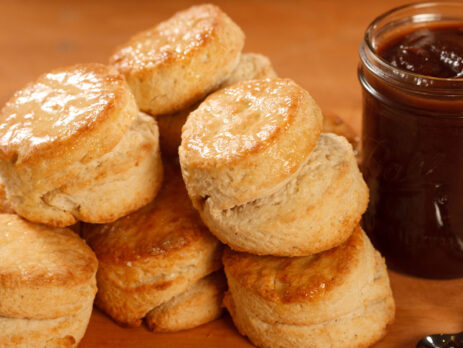Why Cracker Barrel Paid $36 Million For Maple Street Biscuit Company
“When selling a larger business the stakeholders will often times consider a financial buyer such as a private equity group, or a strategic buyer such as a competitor,” states Sam Thompson, a Minneapolis business broker and president of Transitions In Business. “Great story on how the Maple Street Biscuit Company sold successfully to a strategic buyer. This interview also discusses how the seller selected their investment banker.”
When Scott Moore’s job as a VP at Winn-Dixie was eliminated in 2012, he decided to start a restaurant with his friend Gus Evans in Jacksonville, Florida. They called it The Maple Street Biscuit Company and offered what they refer to as “comfort food with a modern twist.”
Moore invested a chunk of his life savings in the first restaurant, and it was a success. A second store worked well, too. Then a third. Emboldened by their early results, Moore wrote a business plan for a massive expansion, which called for building 25 locations across the southeastern United States in just 18 months. To fund the growth, he put his house up as collateral on a bank loan and personally signed a guarantee that, had Moore failed, would have left him penniless.
As it turns out, the gamble paid off when the restaurant chain Cracker Barrel acquired Maple Street in November 2019 for $36 million in an all-cash transaction.
Cracker Barrel didn’t just buy a biscuit company. They already had one of those — it was called Holler & Dash. But when executives at Cracker Barrel saw the Strength of the Maple Street brand, they knew they could be better together.
Big companies buy smaller ones when they realize that it would cost too much, or take too long to compete or they see an opportunity for growth. With Cracker’s Barrel’s resources, Holler & Dash could have invested more money at the biscuit business, but they realized what Maple Street had created was more than just hawking biscuits and building an equal brand would take longer than if they just bought the company.
Maple Street had created a durable competitive advantage because of its brand, which was defined by Moore’s careful choice of words. One way to build the value of your brand — and your business — is to own the vocabulary used to describe it:
Own your product names: Maple Street started with creative names for the biscuits they served. Instead of a generic fried chicken biscuit, you could get from any old fast-food chain, they offered “The Squawking Goat.” Instead of generic-sounding vegetarian biscuit, Maple Street offers “The Iron Goat” (think spinach and goat cheese on a biscuit).
Own your employee titles: The people in charge of bringing the Maple Street brand to life are the employees, but Moore was careful not to call them that. He refers to employees as “family members” and customers as “guests.” In a nod to the vision Moore had for making his stores a community hub, he refers to store managers as “community leaders.”
Own the words describing the way you do things: At Maple Street, Moore talks about “gracious service,” which is about treating customers with grace. Restaurant businesses have back-office people who order food and pay invoices, but instead of referring to headquarters in a generic way, Moore calls it “The Family Support Team.”
Maple Street had an entire dictionary of words they used, which collectively rolled up into a brand and ultimately a culture which is what Cracker Barrel found hard to compete against.
There is a lot more in today’s episode, including:
- The one interview question Scott Moore uses to determine the fit of a potential hire
- Why some employees broke down in tears when Moore shared the news of Cracker Barrel’s acquisition
- The role of theater at a Maple Street location
- A surprising way to discover the value of your business
- The secrets behind Maple Street’s outlandish profitability
- How Moore got customers to clear their own dirty dishes
- Moore’s favourite book about managing people

